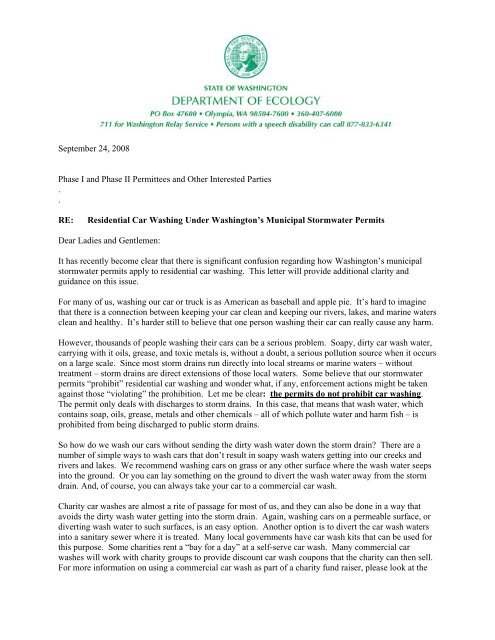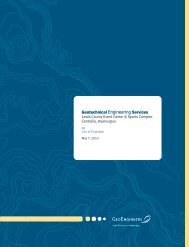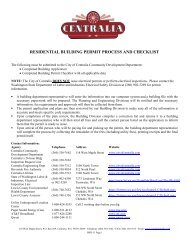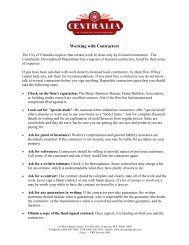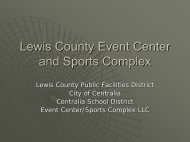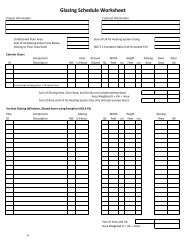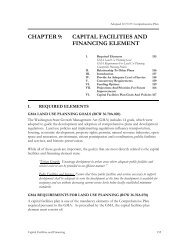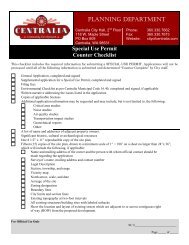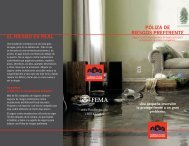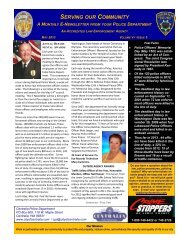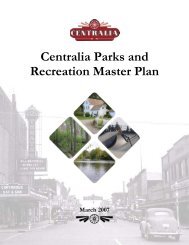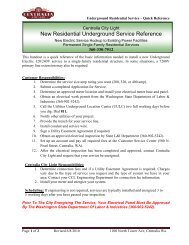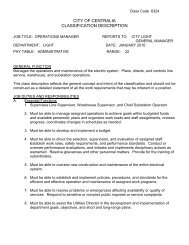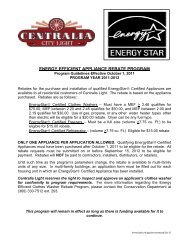car washing. This letter
car washing. This letter
car washing. This letter
You also want an ePaper? Increase the reach of your titles
YUMPU automatically turns print PDFs into web optimized ePapers that Google loves.
September 24, 2008<br />
Phase I and Phase II Permittees and Other Interested Parties<br />
.<br />
.<br />
RE:<br />
Residential Car Washing Under Washington’s Municipal Stormwater Permits<br />
Dear Ladies and Gentlemen:<br />
It has recently become clear that there is significant confusion regarding how Washington’s municipal<br />
stormwater permits apply to residential <strong>car</strong> <strong>washing</strong>. <strong>This</strong> <strong>letter</strong> will provide additional clarity and<br />
guidance on this issue.<br />
For many of us, <strong>washing</strong> our <strong>car</strong> or truck is as American as baseball and apple pie. It’s hard to imagine<br />
that there is a connection between keeping your <strong>car</strong> clean and keeping our rivers, lakes, and marine waters<br />
clean and healthy. It’s harder still to believe that one person <strong>washing</strong> their <strong>car</strong> can really cause any harm.<br />
However, thousands of people <strong>washing</strong> their <strong>car</strong>s can be a serious problem. Soapy, dirty <strong>car</strong> wash water,<br />
<strong>car</strong>rying with it oils, grease, and toxic metals is, without a doubt, a serious pollution source when it occurs<br />
on a large scale. Since most storm drains run directly into local streams or marine waters – without<br />
treatment – storm drains are direct extensions of those local waters. Some believe that our stormwater<br />
permits “prohibit” residential <strong>car</strong> <strong>washing</strong> and wonder what, if any, enforcement actions might be taken<br />
against those “violating” the prohibition. Let me be clear: the permits do not prohibit <strong>car</strong> <strong>washing</strong>.<br />
The permit only deals with discharges to storm drains. In this case, that means that wash water, which<br />
contains soap, oils, grease, metals and other chemicals – all of which pollute water and harm fish – is<br />
prohibited from being discharged to public storm drains.<br />
So how do we wash our <strong>car</strong>s without sending the dirty wash water down the storm drain? There are a<br />
number of simple ways to wash <strong>car</strong>s that don’t result in soapy wash waters getting into our creeks and<br />
rivers and lakes. We recommend <strong>washing</strong> <strong>car</strong>s on grass or any other surface where the wash water seeps<br />
into the ground. Or you can lay something on the ground to divert the wash water away from the storm<br />
drain. And, of course, you can always take your <strong>car</strong> to a commercial <strong>car</strong> wash.<br />
Charity <strong>car</strong> washes are almost a rite of passage for most of us, and they can also be done in a way that<br />
avoids the dirty wash water getting into the storm drain. Again, <strong>washing</strong> <strong>car</strong>s on a permeable surface, or<br />
diverting wash water to such surfaces, is an easy option. Another option is to divert the <strong>car</strong> wash waters<br />
into a sanitary sewer where it is treated. Many local governments have <strong>car</strong> wash kits that can be used for<br />
this purpose. Some charities rent a “bay for a day” at a self-serve <strong>car</strong> wash. Many commercial <strong>car</strong><br />
washes will work with charity groups to provide discount <strong>car</strong> wash coupons that the charity can then sell.<br />
For more information on using a commercial <strong>car</strong> wash as part of a charity fund raiser, please look at the
Phase I and Phase II Permittees and Other Interested Parties<br />
September 24, 2008<br />
Page No. 2<br />
Puget Sound Car Wash Association web site: http://www.charity<strong>car</strong>wash.org/. Many local governments<br />
have developed charity <strong>car</strong> wash kits that are available to charities to use. For example, King County has<br />
a lot of good information on where to borrow or how to build a <strong>car</strong> wash kit.<br />
http://dnr.metrokc.gov/wlr/pi/<strong>car</strong>wash_res.htm .<br />
I want to further clarify that while the permits do not allow soap and detergents to enter a storm drain, we<br />
recommend an educational rather than enforcement approach about <strong>car</strong> <strong>washing</strong>. We definitely don’t<br />
recommend enforcement against charity <strong>car</strong> washes. We urge our local government partners to take the<br />
same approach we will – education regarding impacts and alternatives. We want to work with people to<br />
solve this problem, and we are confident that Washington’s citizens will work with us and with their local<br />
government to avoid polluting their local streams and lakes.<br />
Many citizens already wash their <strong>car</strong>s in ways that prevent water pollution. Others should be made aware<br />
of the harmful impacts of putting dirty wash water into our streams and rivers, so that they can make the<br />
small adjustments necessary to avoid water pollution.<br />
Stormwater is by far the greatest threat we face in protecting Washington’s rivers and streams. Unlike<br />
other pollution sources, the pollutants <strong>car</strong>ried by stormwater come from all of us. Countless tiny sources<br />
of pollution, such as drops of oil or antifreeze, copper shavings from <strong>car</strong> brakes, zinc from galvanized<br />
fencing, air pollutants like mercury or diesel soot that fall to the ground, and many others, all get swept up<br />
and washed into our rivers and streams when it rains. Alone, these sources are miniscule. But added up,<br />
the problem is enormous, and is truly our greatest water pollution challenge. To reduce the adverse<br />
impacts of stormwater, we all have to do our small part. We should be cautious in our use of fertilizers,<br />
pick up after our pets, and make sure our vehicles are not dripping oils and grease onto the road. We<br />
should also be mindful when we wash our <strong>car</strong>s and trucks at home.<br />
Changing how we do things can be hard. But we’ve demonstrated that we can and will do it when given<br />
adequate information and alternatives. Dumping used motor oil down the storm drain used to be common<br />
practice, but now we know better. We intend to work with cities and counties and with individual citizens<br />
– with patience and persistence – to provide needed information about the unintended and often hidden<br />
impacts of pollutants like soap, oils, grease and metals, and about alternatives that allow us to keep our<br />
vehicles clean and still protect our rivers, lakes, and streams.<br />
Sincerely,<br />
Jay J. Manning,<br />
Director


